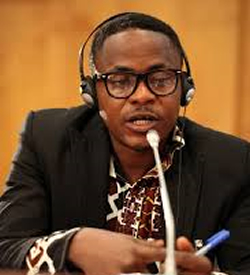

Follow these links to find out more about the Health Policy Project's related work.
- Learn about HPP's work involving Key Populations
- Read about HPP's activities in Ghana
Organization: Centre for Popular Education and Human Rights
Country: Ghana
Area of Response to HIV: Key Populations–LGBT
Interview was originally published in the March 2015 newsletter.
Interview with Mac Darling Cobbinah
Mac Darling Cobbinah is the executive director of the Centre for Popular Education and Human Rights, Ghana (CEPEHRG), a civil society organization based in Accra, Ghana. The Centre focuses on the health needs of lesbian, gay, bisexual, and transgender (LGBT) persons by providing health and social services necessary for the response to HIV. It also advocates for the human rights of Ghana's LGBT community. The HIV Policy and Advocacy Monitor spoke with Mr. Darling to discuss the importance of policy and advocacy in the response to HIV.
HIV Policy and Advocacy Monitor: Can you describe your organization?
The Centre for Popular Education and Human Rights (CEPEHRG) was founded in 1998. Early on, we were denied registration several times because we called ourselves an LGBT organization. However, once we changed our name to its present form, we were able to register with the government in 2003.
As part of our mandate, we help LGBT persons locate friendly health centers and provide them with empowering counseling and professional development activities. We also engage the general population to support social and behavioral change, primarily through educational and artistic advocacy efforts that highlight HIV issues and the needs of LGBT persons.
HIV Policy and Advocacy Monitor: What led you to become involved in policy and advocacy and to work with the Centre?
In my life, I have seen friends beaten and kicked out of their homes because they were LGBT, and I have seen friends die because they could not access essential health services. These experiences made me want to change the existing systems, which perpetuate the cycle of stigma and discrimination, and help expand social services to the LGBT community.
HIV Policy and Advocacy Monitor: What is the current situation for LGBT persons in Ghana?
We have quite a few organizations providing health services to LGBT persons. Most of the donor funds we receive are intended for HIV and sexually transmitted infection (STI) testing and supportive health programming, including condom and lubricant distribution. However, we lack the financial resources to effectively empower LGBT populations or promote their human rights. Donors and organizations largely focus on impacting HIV through targeted interventions with men who have sex with men (MSM), so there are limited services geared toward lesbians, bisexuals, and transgender individuals. Finally, most organizations supporting MSM are concentrated in cities in the middle of the country, so LGBT-friendly health services are largely unavailable elsewhere.
HIV Policy and Advocacy Monitor: Why is advocacy important in the response to HIV?
Advocacy shapes the minds of policymakers, guiding them toward a better understanding of the situation on the ground. Once we are able to educate policymakers, we can work with them to develop strategies that respond to problems effectively. Advocacy works best when all stakeholders are brought to the table to cooperate and address issues.
HIV Policy and Advocacy Monitor: How has CEPEHRG engaged in policy work and advocacy?
CEPEHRG often advocates for the empowerment of LGBT persons and the respect of their human rights. We engage numerous stakeholders, including members of civil society, the Ghana AIDS Commission, and the Ghana Commission on Human Rights and Justice, to raise awareness of the needs of LGBT persons. Finally, we work to ensure the inclusion of LGBT populations in the text of government policies and strategies [for example, in situational analyses] as key populations in need of support.
One of CEPEHRG's recent success stories is the 2014 LGBT National Strategy, which we drafted in late 2014 with other partner civil society members and stakeholders. The strategy specifically mentions social service needs for LGBT persons, including counseling and legal services. LGBT persons often face harassment from government authorities and lack legal support or recognition. Our partner organizations need more resources and capacity-building support to address these issues effectively.
HIV Policy and Advocacy Monitor: What are the main policy priorities for you and your organization?
For me, the main policy priorities in Ghana are to ensure respect for the human rights of LGBT persons and to promote empowerment for vulnerable populations. CEPEHRG is working to increase access to HIV services, in part through the inclusion of water-based lubricants on the national essential drug list. We also facilitate redress for victims or survivors of sexual and gender-based violence, through the establishment of key populations desks [officers or departments handling issues related to discrimination against key populations] at the Commission on Human Rights and Administrative Justice and the Human Rights Advocacy Centre.
LGBT people must have access to psychosocial health services and necessary medical treatment, but health is just one driver of real empowerment for LGBT advocates. We must also focus on skill-building and education for members of these populations who have been shunned or denied access to education. Offering LGBT persons the ability to provide for their own well-being will be truly empowering, and will reduce the spread of HIV and promote a better society for all.